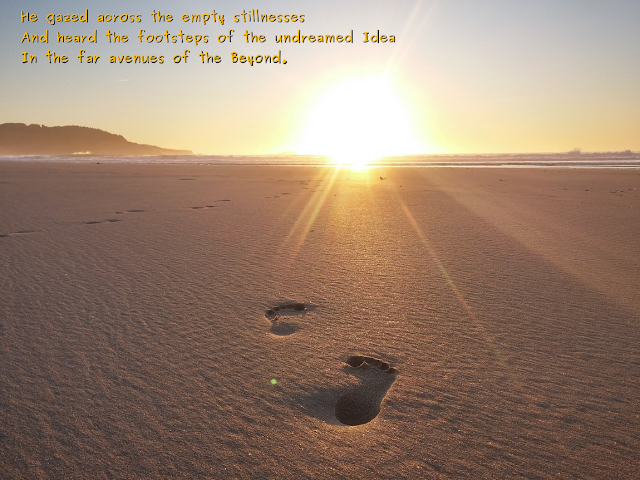He Heard the Secret Voice, the Word that Knows
In the Witness’s occult rooms with mind-built walls
On hidden interiors, lurking passages
Opened the windows of the inner sight.
He owned the house of undivided Time.
Lifting the heavy curtain of the flesh
He stood upon a threshold serpent-watched,
And peered into gleaming endless corridors,
Silent and listening in the silent heart
For the coming of the new and the unknown.
He gazed across the empty stillnesses
And heard the footsteps of the undreamed Idea
In the far avenues of the Beyond.
He heard the secret Voice, the Word that knows,
And saw the secret face that is our own.
The inner planes uncovered their crystal doors;
Strange powers and influences touched his life.
From the mystic spaces where Ashwapati resided, he now took the role of a Witness. The mysterious rooms of Ashwapati's experiences as a witness were built by mind. The windows of inner sight opened and he could see the inner paths actively hiding from a normal sight. His inner eyes could see the past, present and future synthesised as in 'undivided Time'. Raising the veil of the dense matter of a physical body, he stood on the verge being warned by the hissing serpent or the guardian on the threshold. Standing there in silence he gazed into the unending shining lands, one after another and heard the voice of silence announcing the coming of the new unknown things. He looked long and hard in wonder at the empty and still quiet and heard the steps of the unimagined creative Idea on the streets of Beyond which is yet not manifested here. He heard the secret Voice announcing the Word of true knowledge of a new Creation to come into existence in the future. And he saw the secret face of his own higher future Self. The inner planes or levels of consciousness opened their crystal pure doors inviting him in and Strange powers and influences from these planes affected his daily life here.
Illustrating the footsteps of the undreamed Idea.
The Voice of Silence in Theososphy
The secret voice that Ashwapati hears in silent heart are almost similar in their essence to the statements from the book "Voice of Silence" which is the ancient book of golden precepts translated and annotated by H. P. Blavatsky.
He who would hear the voice of Nada("Voice in the Spiritual Sound," as Nada is the equivalent word in Sanskrit, for the Sen-sar term.), "the Soundless Sound," and comprehend it, he has to learn the nature of Dharana (intense and perfect concentration of the mind upon some one interior object).
Having become indifferent to objects of perception, the pupil must seek out the rajah of the senses, the Thought-Producer, he who awakes illusion.
The Mind is the great Slayer of the Real.
Let the Disciple slay the Slayer.
For: --
When to himself his form appears unreal, as do on waking all the forms he sees in dreams;
When he has ceased to hear the many, he may discern the ONE -- the inner sound which kills the outer.
Then only, not till then, shall he forsake the region of Asat, the false, to come unto the realm of Sat, the true.
Before the soul can see, the Harmony within must be attained, and fleshly eyes be rendered blind to all illusion.
Before the Soul can hear, the image (man) has to become as deaf to roarings as to whispers, to cries of bellowing elephants as to the silvery buzzing of the golden fire-fly.
Before the soul can comprehend and may remember, she must unto the Silent Speaker be united just as the form to which the clay is modelled, is first united with the potter's mind.
For then the soul will hear, and will remember.
And then to the inner ear will speak --
THE VOICE OF THE SILENCE
And say: --
...
The name of Hall the second is the Hall of Learning [*The Hall of Probationary Learning]. In it thy Soul will find the blossoms of life, but under every flower a serpent coiled.
...
If through the Hall of Wisdom, thou would'st reach the Vale of Bliss, Disciple, close fast thy senses against the great dire heresy of separateness that weans thee from the rest. Let not thy "Heaven-born," merged in the sea of Maya, break from the Universal Parent (SOUL), but let the fiery power retire into the inmost chamber, the chamber of the Heart and the abode of the World's Mother. Then from the heart that Power shall rise into the sixth, the middle region, the place between thine eyes, when it becomes the breath of the ONE-SOUL, the voice which filleth all, thy Master's voice. 'Tis only then thou canst become a "Walker of the Sky" who treads the winds above the waves, whose step touches not the waters. Before thou set'st thy foot upon the ladder's upper rung, the ladder of the mystic sounds, thou hast to hear the voice of thy inner GOD [The Higher SELF] in seven manners.
...
Behold! thou hast become the light, thou hast become the Sound, thou art thy Master and thy God. Thou art THYSELF the object of thy search: the VOICE unbroken, that resounds throughout eternities, exempt from change, from sin exempt, the seven sounds in one, the VOICE OF THE SILENCE




Comments
Post a Comment